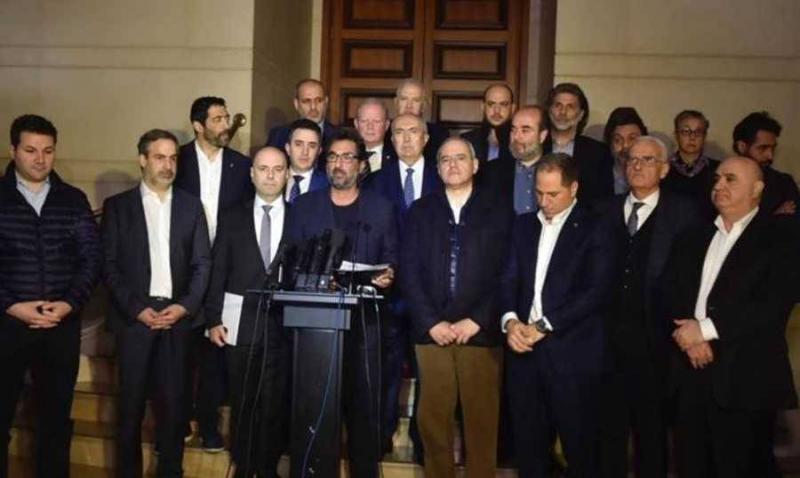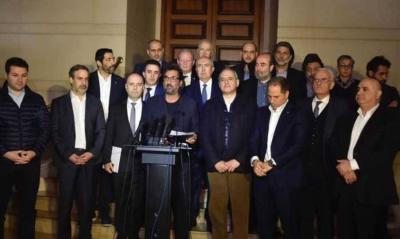The "Opposition Forces" in the Parliament confirmed on Wednesday that they will continue to boycott any legislative session due to the unconstitutionality of such sessions before the election of a president. They consider everything issued from these sessions to be constitutionally invalid. They call upon the resigned government to "cease violating the constitution and to adhere to the limits of caretaker duties," urging all deputies and parliamentary blocs to "necessarily boycott the upcoming legislative session to preserve the constitution and partnership."
In a statement, the Lebanese opposition forces in Parliament indicated that "after deep consultations and discussions, they reached a political framework for confrontation in the current phase, stressing that the time for decision-making has come, and there is no more room for wasting time or arranging temporary settlements that would reinstate Hezbollah’s control over the three presidencies and the country. It has become imperative for all opposition forces to seriously seek ways to achieve the sovereignty of the constitution and law while preserving freedoms across all Lebanese territories, limiting weapons to the state and its legitimate military forces, and finding a path towards a foreign policy that adopts neutrality to protect Lebanon, as well as means to rescue the judiciary, administration, economy, financial situation, and to reform them."
The "Opposition Forces" welcomed the "conciliation efforts made by the French presidential envoy Jean-Yves Le Drian, appreciating any efforts from Lebanon’s friends, but it has become clear that there is no benefit in any negotiation formula with Hezbollah and its allies. Its reliance on the fait accompli outside the institutions to annul their role whenever it wishes and returning to them only when it guarantees results from the democratic processes using its undemocratic means of coercion, intimidation, and cancellation, to serve its hegemonic project over Lebanon, leads us to warn against imposing a president that would represent an extension of Hezbollah’s authority, while reserving our right and duty to confront any path that leads to the continued abduction of the state."
They added: "The only acceptable form of negotiation, within a limited timeframe, is that conducted by the next President of the Republic immediately after his election, centered around the fate of illegal weapons and limiting the preservation of external and internal security to the army and security agencies, thereby allowing the implementation of all provisions of the National Accord Document in Taif, especially the expanded decentralization in its administrative and financial aspects, as well as applying the constitution and international legitimacy resolutions and a basket of administrative, judicial, economic, financial, and social reforms. Any attempt to impose prior political commitments on the President of the Republic is a circumvention of the constitution and the obligation to elect first, rejecting the logic of tying disputes."
The statement also affirmed the content of the Doha statement issued by the group of five countries, namely France, Egypt, Saudi Arabia, the United States, and Qatar, in defining the specifications required for the prospective president, which align with the demands of the opposition. The opposition called on all parliamentary and extra-parliamentary forces to agree on a roadmap for escalating confrontation and a common agenda for reforms, particularly concerning the agreement with the International Monetary Fund on a reform program that preserves the legitimate funds of depositors, as well as approving essential legislative reforms, especially decentralization, restructuring the public sector, judicial independence, and partnership between the public and private sectors. Priority should also be given to balanced budgets and classifying legitimate financial deposits, completing forensic auditing and extending it to ministries, institutions, and public bodies, revealing all financial and non-financial crimes related to the collapse and corruption, holding accountable those responsible for it, as well as decision-makers regardless of their position, safeguarding depositors' rights, and ensuring access to public services, especially health and public education, along with social protections like social security and health coverage to protect the most impoverished segments in Lebanon."
The statement emphasized that "our democratic and peaceful confrontation will be within and outside the institutional framework where necessary, relying on the public's awareness and their adherence to complete national sovereignty and the democratic system." The opposition called on the judiciary, the army, and all security agencies "to bear their responsibilities firmly and wisely, considering only the national interest and not factional interests, and not to relent in pursuing those who disrupt security and civil peace while stressing that the role of these institutions is to protect the populace from armed militias and not the opposite. They are reminded that they are legally subject to accountability and responsibility."
They reiterated the necessity of continuing the investigation into the crime of the Beirut port explosion, from where it currently stands, as well as the crimes in Ain Eble and the events in Kahaleh, to reveal the truth, achieve justice, and hold all responsible parties accountable. They called upon the entire international community, led by the United Nations, to take immediate action to implement the resolutions issued by the Security Council, especially resolutions 1559, 1680, and 1701.
The signatories from among the deputies are:
George Adwan, Sami Gemayel, Waddah Sadik, Michel Moawad, Mark Daou, Michel Douaihy, Fouad Makhzoumi, Ghassan Hasbani, George Akeel, Salim Sayegh, Strida Geagea, Nadim Gemayel, Elias Hankach, Ashraf Rifi, Adib Abd al-Masih, Bilal al-Halimi, Nazih Mattar, Said Asmar, Fadi Karam, Kamil Chamoun, Razi al-Hajj, Ghiath Yazbek, Melhem Riachi, Shawki Dakash, Antoine Habshi, Elias Estefan, Pierre Bou Assi, Ziad Hawat, Eli Khoury, Ghada Ayoub, Jihad Bqaradouni.




